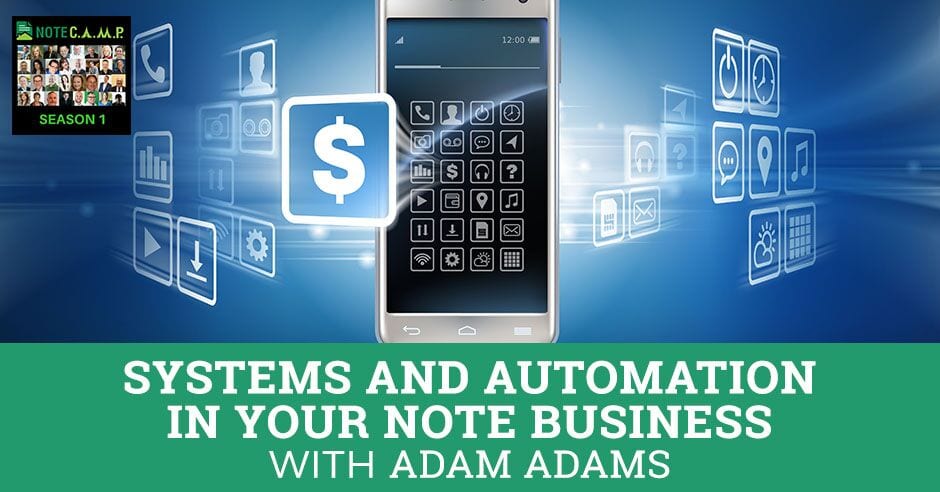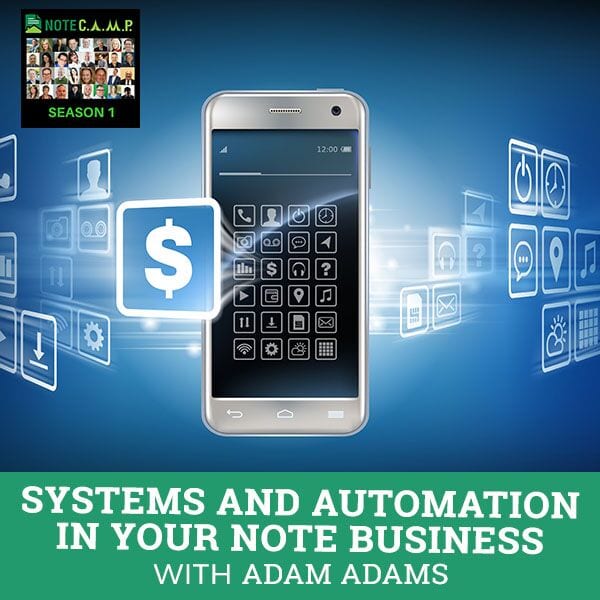
When you’re an entrepreneur, whether you’re in the real estate space or any other type of business, managing everything on a daily basis can be overwhelming. Adam Adams with AJA Realty Investments talks about how he builds systems and automation to help him in his note business. Adam says it’s all about being efficient and staying on top of what you’re doing. He designs his note business around his life so that he is doing the things that he wants to do when he wants to do them and he’s only spending time on the deals that he wants to focus on even without any assistance. Adam shares a good CRM will help you manage your day to day activities, your contacts, or to-do deals, and there are all kinds out there like Hootsuite, Squarespace, MailChimp, etc. that can help you stay in your routine and automate your online presence.
Listen to the podcast here:
Systems and Automation in Your Note Business with Adam Adams
We are excited to have our guest at Note CAMP 5.0. This guy has done such a tremendous job over the last two years where he totally embraced the note business. He came from a different aspect of note investing and saw the opportunities. He has done a great job of embracing systems and the automation side of the business to become the lazy note investor, but in a good way. He designed his note business around his life so that he is doing the things that he wants to do when he wants to do them and making it easy, so that he’s only spending time on the deals that he wants to focus on. He has helped a lot of other note investors with their automation and systems in their business. We’re excited to have you here. We’re very proud of what you’ve done, Adam. You’re rock and rolling. What do you got? You have 80-plus note deals, 90-plus note deals now?
About 70.
That’s awesome. Congrats. We’re proud of you. I’m going to shut up and let you get rock and rolling.
I’m Adam Adams. I’m with AJA Realty Investments. I’m going to go over systems and efficiency. I’ve done these before. I’m not going to get into as much detail on Pipedrive and stuff. We got a lot of videos out there, so you got to go watch those. I’m going to talk about some other things to stay on top of what you’re doing. To me it’s all about being efficient and like you said I’m lazy, so I don’t want to work. It’s one of my bullet points here, and my thoughts are that if I do it right and do it efficient, that gives me more time to not work, so that’s what it is all about.
I used to be a consultant. I’ve got a lot of certifications with Microsoft. I used to be a business intelligence developer and a lot of things we did was integrate with CRMs. I helped design CRMs, specifically Microsoft CRM and Salesforce, so I’ve got a lot of experience on those. Back in 2000, a company I worked for spent the money to teach everybody how to use Franklin Covey. This was before digital, so we had to write down everything, but it got me in a good habit of writing down my to-do’s and how to manage them because even though I might write it down for the day, I might not do it today, so how do I put it in the future and make sure I don’t forget anything, back to this being lazy.
I remember my first day in my regular unit at the army, I had to sit down with my sergeant. I told him I was lazy and he didn’t like that. I explained that I was very good at getting the job done and getting it done right, so you don’t have to do it twice. My reward was I got to go back to my room and hang out. We always like to hang out my room because we got pretty efficient, so I don’t want to work.
We currently have 68 notes. I’ve got a few other deals on the side with some other stuff, but that’s just me. I don’t have VA’s. I don’t have assistants. My wife will help me once in a blue moon but most of the time, it’s just me. I don’t know how many people we touch; we touch thousands of people. Every week I sent out an email blast, I put up some articles on our website, and I’m always on BiggerPockets doing stuff. It doesn’t take too much time, but I still am able to connect with a lot of people. Because of all of this, we’ve never had a capital issue with assets. We can’t get enough of them, but it’s a good problem to have.
I like to automate my online presence. I will go to my website and I will post an article or blog and I use Hootsuite and it will grab everything and post it to all my social media. I only send about one email blast a month, a monthly newsletter. We’ve got two, one for our preferred investors and one for all the potential investors, and there is a difference. If you get on my potential investor list, you will figure out what it means to be a preferred investor. I try to blog once a month. I’ve been buying. We’ve been moving a lot and doing a lot of things, buying a house, selling a house. I’m behind on some of these things, but I try to stay in a routine. We’ve been getting the newsletter up, which is the big one.

I use Squarespace for my website. It integrates well with Google, and using Squarespace, everything else gets hit with Hootsuite, that’s Facebook, LinkedIn, Twitter, all those social media. I post all my blog on my website and it creates an RSS feed and that’s part of the website itself. Hootsuite monitors this RSS feed and when it sees anything it will post on all these different social media websites. All I’m doing writing this or posting something on the blog and then everything else is automatic, so I don’t have to do anything. I might take some articles from my newsletter, that might be a blog, I might go get a news story, link and paste it over here on my blog, I might do a CRM video, and everything else is automatic and it saves me a lot of time.
I use MailChimp. BiggerPockets, not too much automation on BiggerPockets for me, but I try to stay active on it. I will just do a couple of posts here and there, replies, and just get your name out there to make known what you’re trying to do. What does this all lead to? Presence. A lot of people know me because I’m always touching them. Presence leads to recognition, recognition leads to authority in your field. It doesn’t mean you know what you’re doing, but a lot of people think you do, so as long as they think you do, they’ll give you money. I’m not saying I don’t know what I’m doing, but it’s the truth. If your name is mentioned all the time, you will be associated with that field you’re in and that’s a good thing.
When I send an email blast through my MailChimp, we get around 5,000 emails a month, blast. I’ll spend a half a day or more on the phone or responding to emails. That’s one reason why we only do it once a month because I dedicate some time afterwards to talking to everybody. Last time, we raised money for pool, I raised $960,000 in four hours and we had a wait list. That’s good. I want to try to be able to do that with notes on apartments. I know I could raise a couple million dollars. I want to try to do it with notes, but we did it, so that felt good.
Now that I have capital and I’ve got deals, how do I manage all this stuff? I use CRM. It means Customer Relationship Management. It’s a tool. You have to have some habits to go with it, but it’s a tool that helps you work through the lifecycle of an asset or a deal. Not all deals have assets. CRMs are geared towards sales. When I grew up, I never wanted to be in sales. I’m in sales. I grew up to be a salesman. Doing this business, there are sales, like it or not. That’s why we all do. We are selling to people we are trying to buy from, selling ourselves, or we’re trying to sell ourselves to people to invest with us. We’re salesmen. The other thing that a good CRM will do is help you manage your day-to-day activities or to-do’s, manage deals and manage contacts.
There’re all kinds out there. Salesforce, I used to work with that one a lot and Microsoft CRM. It’s going to cost you a lot of money though. I don’t want to spend $150 a month on it. Pipedrive doesn’t have everything but it has the most important thing for me, and that’s email integration, and we’ll go over that. I pay $25 a month for using their service, me and my wife. If you pay for a year in advance, it gets cheaper, like $22 to $20 a month. I’ve tried Soho which is great. I think they’re a nice company. I paid for the trial and I’m getting my money back. I pointed out they are missing that whole email integration. They are giving my money back, they’re very nice. They do have every bell and whistle I can think of but they’re missing email. Insightly is another great product. It’s missing email integration.
I got a couple of debates on BiggerPockets recently and Insightly came up. They do have apps to hook up with your Google or your Outlook maybe, so they will call that integration and it’s not. I downloaded the APP, I messed with it, and what it would do is you find an email you want to be in Insightly and you click on it, it will send it to Insightly. Then you go open up Insightly, and then there’s the email and you do what you need to do with it, but it’s not an integration. That’s two systems and two jobs. What I mean by integration is I got one app that has my email and my CRM together and that’s what I’m talking about when I say integration.
Podio is same thing. That was more of a project management tool. A lot of people usually use it for CRM, but it’s still missing that email integration. Trello is a group project system that’s missing email integration. MailChimp, people like to call it CRM, but it’s an email marketing tool. We see Salesforce and Pipedrive, they integrate email and there are some versions of Salesforce that I’ve worked with that didn’t have the integrated email. It can work in your Outlook and Salesforce would be integrated with Outlook, but then you go over to the Salesforce main page and so you’re working in two different systems and that’s what I’m trying to avoid. Pipedrive, it’s all in one system.
Other CRMs have ways to attach emails to deals and there tends to be carbon copy addresses. Each deal has its own separate address. That’s a headache. You’re going to be looking up addresses trying to figure out which one to use to send this email to that deal. If you do that, you created another job and you don’t want to do that. Being able to associate all my emails to a deal means I can pull my deal and I can see all my emails. It’s very important, sometimes these deals drag out for years and I would like to be able to pull up all of my correspondence. I have been sued and one of the things they did ask for in the lawsuit was all my correspondence and it was very easy because all I did was pull up the deal, I printed out everything, and it took me 30 minutes for an asset that I’ve held for over a year. It has its advantages to be able to do that. Being able to do this allows me to have more time to focus on other more important things, whether it’s more work-related stuff or personal stuff.
One of things I always like about a good a task pool is prioritization. If you go read upon Franklin Covey about how to prioritize your tasks for the day, the way I prioritize mine is number one, will I make money today? If the answer is yes, it is a top priority and I’m going to focus on it and try to get it done, because if I was going to make money next week, it’s still important, but it’s not as important, so it’s a number two. Is there a legal requirement? Sometimes I’m not going to make any money, but it’s still something I have to do and maybe the law requires it or it’s just a responsibility on my part that I said I would get it done and I need to get it done, so I would still make that a high priority. Then you got level three that something needs to be done, but that may be done in a day. It’s not going to affect my pocket. I’ll make that a level three. If it’s something I want to do but has no consequences whatsoever, I could postpone it for a year and it would not impact anything, that’s a level four. That’s how I grade things.
The tool I use on a day-to-day basis for my professional life that allows me to do that. It is a shortcoming with Pipedrive, I can’t prioritize, but you’ll see where it comes into play. Use your calendar. I do have a weekly schedule. Mondays is operations in my day-to-day business, taking care of whatever pops up. I spend Mondays on marketing. I got to read my news stories, I try to get my blog posts for the week, I might write my newsletter, I might do a video. That’s Mondays.
Tuesday through Thursday, I do my operations in the morning and I go note hunting the rest of the day. I’m calling banks, checking leads, going through maybe some county records to see if I can find a lead somewhere. That’s what I’m doing Tuesday through Thursday. Friday, operations in the morning and I keep my books for the rest of the day. I’ll go update everything and when I’m done, I go mess around and do something else.
Filing. I remember someone asked me, they said when they do due diligence and they’re pulling all these tax records for things they may or may not buy, a friend of mine asked “What do you do with them, Adam?” I’m like “I don’t pull them for one thing and I don’t need a copy. The county has a copy. The county is my filing cabinet.” Don’t print out everything and don’t feel like you need to keep everything. I don’t keep that much. I shred a lot of stuff and I put it in my compost. Shredded paper is great for compost, but take what you need and get rid of what you don’t, minimize your stuff. We do scan a lot of stuff. I’ll get a lot of things in the mail, scan it, put in the proper digital file, and I get rid of the paper. I won’t fill my warehouse with all of this. They take up much space.

Another thing we do is I like to own my assets. I have the same format for my folder structure. If I got an asset, that asset gets its own folder, and I got all these other stuff. I’ve got due diligence, I’ve got collateral, I’ve got workout folder, invoices, and they’re all the same. That way, anytime I go to a folder, I know where files already are. Just be consistent and do it the same way for every asset. Let the vendors do the work. I learned in apartments to manage the managers. Don’t try and run 100‑unit apartment complex. Pay someone to run a hundred-unit apartment complex and you manage them, so I’m only managing one person or one company and they’re handling the other 100 units.
I do the same with this. I let my attorneys do their work, I let my property managers do their job. I try not to tell them how to do their job. It’s not my business, it’s theirs. I pay them to do it. Another thing, I see this all the time, they work for you, but they’re not your employee. Respect their time. Actually more vendors require minimum because you might have one note with this vendor and you’re taking up twenty hours a month on phone calls and emails. You just need to back off and let them do the work. That’s the whole point of this, don’t work. I don’t want to work. You need to learn to delegate and let go and let other people work for you. If you do that, you’ll have so much more time. Killing that squirrel. That’s what it’s about.
The right tools allow me to manage my time and stay focused on what needs to be done and that’s business and personal. I’m very good at what I do. Now that the squirrel is dead, I got more time to do more deals. We got 68 and it’s just me. No assistants, no nothing. I do it all, and I got time for more. I’ve got plenty of time to go raise capital. I do a lot of business lunches, I got a lot of conferences. I got time for it. I volunteer my time for other causes. I cut the grass during the week so I don’t wait until the weekend. I try to sleep in later. I do get up. I got tasks and I’m early bird but I have that option. I do take naps. I play video games. I’ve been playing since my pong days back in the 1980s. Both my wife and I do work from home and I do go hang out with her in her office during the day because I got time. She doesn’t but I do.
Some of the imperfections of Pipedrive, it doesn’t automate tasks. I use Automate.IO to do most of my automations and use Zapier for a couple. I do talk with Pipedrive about once a quarter when we do share screens and they show me what’s coming out and they have me test things. They do have automation coming. It looks pretty cool, I can’t wait. I can assign an email to multiple deals, but it turns out you can’t do that with any system because so far. Pipedrive is the only one that has email integration, so I can’t prioritize my tasks. It’s very important to me. It can’t do that, but I’m living through it. I can’t flag emails or turn emails on a task. They have created some improvements and make it easier to create a task while you’re in an email. I’d like it to be more automated, but it’s an improvement. It’s working. It’s what’s available.
Everybody’s complaining about all these not being automated and I said, “You go to war with what you got. You don’t wait until you have all the right tools.” Those are what’s out there. Those are what I use. That’s what I needed to do. I speak to Pipedrive a few times a year. We have a good relationship. I’m not part of the development team. I’m not an employee, but I do a lot for them and they involve me with their development, which is cool.
Other tools to be more efficient. Automate.IO, you get five free automations. You can get very complex with them. I use it a lot. If you do pay, it’s a whole lot cheaper than Zapier. Zapier might have more integrations for automation, you get what you need, not necessarily what you want. Automate does a great job. Zapier does have some free automations, but with automation, you can do one task. For example, I might be out and about and I’m on my phone and I get an email and I need to remember to create an activity later in Pipedrive. I’ll start and Zapier will see that I started it and it will go create an activity in Pipedrive and I use Zapier for that. Remember the note, I’ve been using this for years, maybe a decade. Dropbox, a major cloud storage. There’s a bunch out there. I use Dropbox. Google Drive is fine. You got Box, but my entire business is on Dropbox. I’ve got three computers. I share files with my partners. Whatever I do on this computer that I’m on goes up to the cloud. My cloud integrates my other computers, so anywhere I go, whatever computer I’m on, I’ve got all my files.
Google apps, Contacts, Gmail, Calendar, all integrate with a good CRM. My CRM is Pipedrive. TripLog is great. If you’re running around in the car, it will log those miles. Triplog is cloud‑based, so once I start driving my car, it starts recording my miles, when I’m done, it uploads it, and then I can download into Excel and give it to my accountant at the end of the year and get my deductions. It’s a lot like CloudBees is that if I use my phone or if I have to do a manufacture reset, I don’t lose my miles, so I’ll download them, sync it with my new phone or with my computer and I still have all my expenses. Evernote, I don’t use it for business, but I do use it a lot. You should try it out, check it out. We use it a lot for our grocery list or password list, and I share it with Jen so we’re both in sync on that kind of stuff.
Professionals, don’t do everything yourself, pay other people to do it. I let my attorneys do their job on. I just hand it over. I might talk to them once a month, “What’s the status? Tell me what the next data I should be looking for. I’ll put it in Pipedrive” and the day after, I’ll go ask him what happened. I let them work. I let my realtors do their job. I pay someone else to do loss mitigation and they do a great job. Servicers, I let them do their job. I check their job. That’s all I do. They give me the books at the end of the month, I make sure it’s correct, if I got a question, I will send an email and it gets fixed. I pay someone to teach me how to keep books, so I’ve been paying about two years now. I’m pretty good at keeping books now, so I don’t see her as much, but I still have her check my stuff.
Don’t master everything. Be a master delegator. One of the hardest things in this business is letting go. Can you trust that realtor that you’ve been working with? Can you trust that property manager? Can you trust that attorney? You don’t have a choice. Pass it off to them. Share the function, share the work, if they do a great job, keep working with them. If they don’t, go find someone else, but you can’t be doing everything. You can, but you won’t have any time.
I’ve been teaching people how to do this stuff for a couple years now. When I say teaching people, I mean I do some shares, I got videos out there. They are operating. Just go on my website. I don’t teach people how to do this stuff. I just do these little webinars now and then. If you do want me to teach you, that’s $150 an hour for four hours total. I don’t want to be teaching you, so it’s going to cost you a lot.
My Pipedrive email is the same as my Gmail. This is what I’m talking about with integration. I could kill this, which I will do, and I can still work with my email, my Gmail, it’s in my system, I don’t have to go back and forth between systems. My daily activities stuff, it is by priority too. Orange is my number one. I got dark blue for number two. I got light blue for number three and number four is gray. I always organize my day. I always like to accomplish something, so when I come here and get my coffee, I’ll check that off. Even though it’s not going to make me money, it’s still very important that I go clean the tank from my aquarium, so I always put that up there.

Systems And Automation: CRM, you have to have some habits to go with it, but it’s a tool that helps you work through the lifecycle of an asset or a deal.
Once a month I download the AOM data, that’s the apartment data. I like to keep up with certain markets, so I have a little task I repeat every month that tells me to go back and download the next month, so that’s up there. Send out email blast is once a month thing. I update my Smartbars on Gmail. It’s another tool I use on my website, it shows a pop-up that encourage people to give me their email address. I’ll have my BP blog once a month. With our anniversary coming up, we met at Ben & Jerry’s, so a little annual reminder for me to go get some ice cream. I get an oil change, I got that done, so I’m going to check that off. Check aquarium water, I change and clean it, but I still try and keep track of this stuff and treat the yard and stuff like that.
There’s stuff that I don’t care about so I took a note real quick and it’s a low priority. I want to go buy some but if I haven’t bought it today or in two years, it doesn’t matter. I keep track of that and I got my little list. Music I want to listen to, I don’t need a date on them. Things to smoke, I’m not talking about a pipe, but I like to smoke too. If I get an idea, I put in there. I’m able to keep track of all stuff. It’s pretty cool and it’s a great tool that I use. TripLog, this is on my phone, this is on a desktop, browser-based. I’m able to keep track of my miles. I don’t feel it’s a big deal. It is $0.53 a mile in the rate right now, so those business trips start adding up. I’m tracking my business models and I get my money back after tax down.
Here are some of my automations. On my automation stuff, when I create deal and I throw it into due diligence, I have all these little tasks to do. There’s a lot. I don’t want to be typing this in every time I create any deal. I am ordering a BPO, sometimes if I’m in a new territory, I’ll get GPPS, I order an O&E or Black Knight, they got a nice flow tax report. I get that from them. I call for taxes. I get service notes, I get digital collateral, I get the payment history, code enforcement. There is a lot of stuff going on with my due diligence but I want it to be consistent with every deal. If I type it in every time, I forget something, so I just want Automate.IO to create my tasks for me. That way, every time I do it, it’s the same.
I got one for due diligence. I got some automation for when I sell a property or I cancel insurance, I got utility to pay them off, just things you do every time you sell a property. That’s the stuff I automate. That’s stuff that is repeated over and over again.
Foreclosure, I don’t have that much, but always good to get a new O&E when you do a foreclosure and always review the payment history with the attorney. Those are some easy repetitive things that you can have the system do for you.
An audience asks a question here, “What structure do you prefer for your note acquisition? LLC or trust?”
LLC. We buy them. I’ve been developing my asset protection for couple of years now with a couple of attorneys. When LLC buys notes, they become properties. I turn something to a little property. AJA is the latest addition to it. AJA Investments is the management company. That way I’ve got one front, one page for all the different companies I have for my different assets. Every company gives permission to AJA investments, handle insurance, handle recollections, handle payments, and do everything and there is a $50 fee a month for each asset. That way, they’re all separate, still online, but they’re all separate, but I can still have one company, one LLC operate everything. I don’t do the trust. If you’re on an individual level, trust would be okay, but it is a business, so I run it companies.
I’d agree to that. Trust can be nice for anonymity for the most part, but if you start selling assets, moving assets, your LLC would be the easiest thing to do. Plus a lot of times you have title companies, you have to pool assets out of the trust, you end up selling them at some point and that’s what you got to keep in mind.
That anonymity stuff, it only works to a point. If you want to do business in other states, you got to go register and you lose that anonymity once you do that. In Indiana, I have to have a registered agent for any asset I own up there. If there’s an asset, they got to go look up the agent, they know how to get me insurance or if they want to make contact, so you got to tell every state who you are.
How many notes are you holding per LLC?
I hold a note in one LLC. Actually, I got two because I got that San Antonio stuff. If they become physical assets, if they become REOs, that’s when I start moving them, and it’s dollar-based, so I might have $100,000 asset, I might keep that by itself and then I might keep a bunch of low-end rentals and another one, maybe four or five or something.
When you’re talking about Soho, do you mean Zoho or Soho?
Soho.
Another audience also asks a question, “Do you do a lot of driving for notes?”
No.
Let me give you a little bit of example. Adam was up in the Dallas area, you recently co-purchased a portfolio of notes in San Antonio though, right?
Yeah.
Did you drive by those yourself?
Jo and Jamie did. Jamie got an offer. No, I’ve never driven by anything before I bought it. I always pay someone else to do that stuff. I build relationships with my property manager. I’m not expanding all over the country. I’ve got specific areas I buy in. I’ve already got my teams built up there, so when I get stuff, I shoot them the addresses and they tell me right off the bat what neighborhood it is. If it gets to the point where I get my bid in, I can make a drive-by and get photos and rehab stuff.
Another audience asks a question, “Adam, you are the man. I love your systems. What markets are you focusing in? What is your asset value sweet spot, if you don’t mind sharing?”
It depends. Every market is different so if I got buy-in for it, I’m buying low end assets there, but they’re getting rentals. A lot of companies are moving there so I’m playing a long game on that, but if I were to buy in Dallas or San Antonio, our stuff ranges from the lowest is about $40,000, but we got one listed for $100,000. We did some rehab and I’m likely to get $144,000. Midwest is cheap. Dallas, Texas is expensive. I can’t answer your question on a dollar value. It’s regional.
Definitely because you’re going from Flint, Michigan to different areas and Flint is one of the lower price assets, but you’ve got a strategy there for you. You get the longer term play over there because people in Flint still need places to live and there are some nice areas in Flint. We’ve made money in Flint for years.

Systems And Automation: The other thing that a good CRM will do is help you manage your day-to-day activities or to-do’s, manage deals and manage contacts.
Yeah, it’s all about your teams. I know we’re not the buy and flip. It might be watching Flint down on that place, that all shows in that little triangle on the north side of Flint, and that’s the bad part. You don’t want to go there, but if you go West Flint, over by Flint township, if you can get in Flint township that’s great. There’s a huge town there and a lot of little town names. I saw one in metropolis, but you’ve got to know where to buy, but again, it’s going to be cheaper. My rehabs in Flint might be $10,000 for a new roof, new windows, and walls to get it rent ready, but I go down Dallas, $10,000 is going to get me a pergola and that’s about it.
Another audience asks, “You pay your management company?”
Yes. I pay everybody. I try not to do anything.
Another audience asks, “Have you looked at other CRMs which have content management, auto‑responder, and email integration, considered active campaign?”
I use Pipedrive for marketing. It has got some functionality, but I can integrate Pipedrive with MailChimp, especially moving my contacts back and forth and it’s got a cool little thing, so I can see if someone read an email. I might write up a template and send it out to some banks and stuff and I can see who read it or not. Again there’s a difference between CRM and marketing, and I use Pipedrive for CRM.
You pay your own management team. You pay your management LLC $50 a month per asset. Is that correct?
I was talking about setting up AJA Investment as management company to manage all the REOs and stuff or if I got a syndication, I can still have that as a management company. That way I still get my rates or insurance. I still have one contract for insurance regardless of what company I’m using to cover, or my property manager is outside the state. I don’t have to create a new contract with him because I’m moving REO over to another LLC, so I can still have AJA as the management company. My other companies pay AJA investment $50 a month to manage the assets. All the fees are getting reimbursed through the company. That’s what I’m talking about. In regards to management companies out there and my property managers, I pay them for everything.
An audience asks a question, “I have the time to run my business as a one-man team as well. I’m a new investor and I love the research aspect that is usually delegated to others. Did you start out on your own or do you think I should work with a team until I learn the ropes?”
I do all my own work. I don’t delegate the research to anybody.
She’s missing the point. You were using some automation to pull stuff, but you’re still putting your eyes and all the due diligence is what you’re trying to say, right?
I don’t any automation to pull anything. My due diligence, I’m pulling values out, I pull them myself. I’ll send off things to my property managers and my realtors and what do they have to say and I’ll compare. I usually give them the final word because they’re there, I’m here.
For example, Indianapolis. If I got a bunch of note, assets on the tape, I’ll send them the list. I don’t even pull comps. I just send to him. He’ll shoot them back to me in a day or two. He’s not going to go drive by, but he’s going to say, “This neighborhood is like this, these are the values you might see,” and I’ll just put it down in my calculator, and if the numbers work, then I’ll put my bids in based off of that. If I get my bids accepted, I’ll have them go drive by. I pay them a pretty penny if they do all that stuff to do the drive-bys. He gives me the initial information for free. Is that automated? I guess it is. I send an email and I get a response on values. I’m still pulling, I’m getting on Zillow or the others. Zillow is great. If you know the right tab, you can see comps in the area and it gives you a ballpark. That’s what I’m looking for, is ballpark.
“Do you use a call answering service?,” an audience asks.
Nope.
We don’t use a lot of that. You are talking to people and stuff like that. A lot of you are coming from the real estate side where it’s used to using bandit signs and things like that. We don’t use bandit signs in the note business, we don’t list. We’re using realtors to pull comps, we’re giving them the listing and then letting them handle the phone calls. We’re not trying to do everything ourselves with the call answering service. Like he said, he uses vendors, he lets his vendors and attorneys use that stuff, that’s why they’re there for you. “Do you use a specific software for your ROI calculator or you’ve designed your own?,” an audience asks.
Designed my own. I’m a database developer, so first thing I did was design.
Are your vendors, attorneys, title companies in each market or do you use one for all of your note due diligence and closings?
For example, I got Franco up in Ohio. He takes care of Ohio, Indiana, Kentucky, and Michigan and Texas. I only got one attorney. In Missouri I only got one too. Loss mitigation, Singer, they cover everything. It depends.
An audience is asking if you can post or send out your bot layout to help automate activities?
Yeah, I got it all down on the videos.
Another audience asks, “When you say you have people in a place in a market, who is on your team in a certain market?” It’s the same thing we’d use. You’re going to have a realtor. You’re realtor’s going to be your local point for finding either rehab crews or makeup crews or other things. You want to add to that, Adam?
Local areas, it is going to be my realtor or property manager. Sometimes I develop a relationship with maybe some rehab crews, but usually I leave that up to my property managers, but that’s the only local. Title company sometimes.
You have your realtor pick the title company when you sell on a REO. The same people you would use in a local thing is the same people you’d use it in a remote area. It is not rocket scientist stuff. You’ve got to get out and if you need a realtor, get on the phone, jump on Realtor.com, and jump on Zillow. There’s a great way. Ask people at WCN crew who they use in a market for realtors. We use real estate attorneys. We have one in every state for the most part. You might have like what Adam does or we use where we got Franco. He handles Michigan, Ohio, Indiana, is that correct?

Systems And Automation: Being able to associate all my emails to a deal means I can pull my deal and I can see all my emails.
Michigan, Indiana, Kentucky, Ohio.
Texas.
Yeah, I got five with them.
An audience asks, “Did you see the MOBIT presentation, observations?”
That’s a part of it but that’s not something I do. I’ve got money. I’ve already got my money people. I’m not trying to market as much. Part of it, I came from an apartment world, and I have been there and still in it for five years, and I still hang out with those people and I meet new people. I already had an investor list before I started notes, so that’s one advantage I had, I guess. I go on bus trips for apartments to get my money for notes.
Let me cover this a little bit. My deal flow for notes. I got another company that’s got a whole bunch of other notes and the stuff that’s already closed out. I sold out closed the books, they’re gone and you don’t see them when they’re closed. There’re all open notes for AJA Investments. I got to do due diligence and when I was talking about that automation, I put a dealer and it creates all these tasks in each asset and I open up this one. Some of them don’t have that much. There is a task I need to do and I’m going to give this lady a quick lien and release on a loan.
When I was talking about the email integration, these are all the emails I’ve had on this note, and it’s all here at my fingertips. This is what I like about it. It keeps going back. I’ve had this thing since June of last year, but every correspondence about buying it, every correspondence with low loss mitigation, attorneys, everything’s in there and all my activities that I’ve done with this note or any notes I’ve got, they’re in here too. This is what it’s all about for me. It’s all in my fingertips and this is the only software I have found that lets me do this easily. There’s a hard way to do this and everybody’s got the hard way. This is the easy way.
Back to the deal flow, I got my different stages. Foreclosure, trial payment plan, performing loans, REOs, rentals, bankruptcies, those things. There’s the ones I’ve sold, but I’m still waiting on one more check or something to close out the books, the JV deals I’m on, miscellaneous stuff. There’s the San Antonio stuff. Every once in awhile, I’ll get a correspondence for AJA Investments that should be going through different email. I’ll log it here and that way I can see what’s going on. I got no place to go look for stuff. We got my mail, so that is my Google, that’s my Gmail, and a few deals that are connected, so there’s five of three all of them. All that ran up in the Midwest, I’ve had nothing but problems. I had another flooding issue I’ve got. We’re doing a rehab there but I want to associate this deal or tell you and it’s linked. There’s an email that I just got that I just linked. Here’s all the emails link will tell you and a lot of rehab stuff.
Activities. I’ll show you how I could prioritize all that and all that good stuff. You can’t do that with Pipedrive. I wish I could. They’re working on it, but every activity is equal to the next activity and I don’t like that. It is what it is and I work through it and I can see which deals I have activities I need to take care of. If it’s a monthly newsletter, it’s not associated to anything. If we just moved, I have all these addresses I got to change. Several stuffs, same third insurance. If you’re paying insurance, if you’re paying that FPI, force-placed insurance, if you send out the notices, you can start billing back, and so I got a little to-do to do that.
We’ve got the contacts. There’s all the contacts that are on my Google, but I’m able to flag certain things to create lists, my realtors, my preferred investors, dealing companies, banks to call, sellers, and my vendors. These are all my vendors. I create little flags so I know what their role is, my property managers, my legals, giving me good BPOs, they’re all at my fingertips and that’s what a good CRM will let you do, have everything at your fingertips. The less time I spend looking up stuff, the more time I got to do something else. That’s what a CRM is for.
A comment from the audience says “You’ve got nine videos on your YouTube channel that goes into more detail on Pipedrive, all of them are less than hour. I watched them all this morning. Very informative.” I would also encourage you to check that out. Follow Adam there on his YouTube channel. There is great stuff there as well. An audience asks, “On average, what percentage of yield are you seeing in today’s market?”
I don’t know. I’m not buying performing loans. I’m not looking at yield. I’m looking at ROIs. Yield is if I go pay $100,000, over the next ten years, I will only get back $110,000. That’s a yield. ROI, I will pay $100,000 and next year, I want to make $10,000 profit, so that’s 10% ROI. Don’t confuse the terms. If you’re trying to sell someone on investing with you, make sure you know if it’s non-performing, you better be talking about ROIs. That’s what I do, because I buy non-performing.
In your due diligence calculator, how do you calculate your repair costs in case a note becomes an REO?
I usually base it on square footage and condition, so there’s a ranking. Good condition, fair condition, average condition, poor condition, 1,000 square foot or it’s in good condition, I might price that $6 a foot. If it’s in poor condition, I might price that $25 a foot for rehab.
That’s a great formula, but for the most part, you’re usually looking at occupied assets to begin with, right Adam?
Yeah for the most part, if I buy non-performers, I might have to rehab. I plug it in. I don’t want any rehabs, but some of them I do. I tell you one in Cincinnati, we wanted it, so we wanted to try and estimate rehab on it. I might have a formula, but if I got a good team in that area, they’ll do the drive by and they might have better experience in that area. A rehab in Michigan is a hell lot cheaper than rehab in Texas. I’m not going to know what the rehab costs are going to be in every region, that’s why I try and depend on local people.
An audience asks, “Does Pipedrive provide content management, so all paperwork is filled by the deal?”
You can upload files to a deal if you want. Personally, I don’t. I use Dropbox, so if we go back to one of the deals, I created a custom field and there is the Dropbox folder. I make sure all my files are in the right Dropbox and now I have access through Pipedrive to all my files. I could upload files here, but I don’t it. To answer the question, yes, everything is synced in with Google, so you could sync with Google Drive, upload your files to Google drive, but all my e-mails, all my contacts, it’s all Google. My calendar is Google. It’s all Google and it also syncs with Outlook.
An audience asks, “Do you mind sending out your bot-automated activities?”
From the video.

Systems And Automation: One of things I always like about a good a task pool is prioritization.
He says he didn’t see him. He got to watch again.
From automation.
You got to watch it. I guarantee, you can watch all the videos in twenty minutes. They are tiny plus your automation video, Zapier, and you had one bot. You mentioned you now have five. Why was it you said you still prefer Automate.IO?
I got four automations, but I got a dozen tasks here that’s free. I can’t do that with Zapier. Zapier lets you do one task. If I start an activity in my email, my one action is to create an activity in Pipedrive. I could not create a second activity, not for the free version. I can create multiple activities in Automate. I can only create one activity in Zapier. This works for me. It is great, but I can’t use this in Zapier for free. Does that make sense?
You picked the right apps that allow you to do it for the cheapest. Effective for the cheapest. There’s nothing wrong with that at all. Good stuff.
If you ever get to the point where you’re paying for one with automation, Automate is a fraction of the cost of Zapier? I have not had any problems with Automate.
That’s what I love about you, Adam. You’ve got the mind, you had gone out and hack through the weeds of all these different apps to find the stuff that works the best for you to be able to automate this, so you can take more naps.
I’m always still looking at other CRMs. I swear every other week I’m getting a challenge. “Did you check this one out?” I’ll go check them out. Sometimes it takes me about five minutes and I know if I don’t want it, but that’s all about that email integration. If someone shows up with something better, I’ll switch, but nothing yet.
Do you ever have any a virtual assistant do any of this or any of your due diligence or your marketing or anything like that?
No. It’s all me.
An audience asks, “Are you paying for Hootsuite?”
Yes. I do pay for Hootsuite. If I go on trips and stuff, I’ll try and post from my phone and things like that, but Hootsuite does pretty good.
Have you tried Follow Up Boss?
No. What is that?
A new one.
Is it CRM?
He didn’t say. It’s a CRM too. Instead of throwing 20 different CRMs, have you tried this or tried this, you’re more than welcome to follow up with Adam. He’s got his email address that he shared for you. Trust me. You’ll want to connect with them. Adam, you’ve done some things. You’ve adjusted your business, specifically after you purchased that large portfolio, so chasing one off. You want to share how your business model has changed since the portfolio?
If I ever saw the right single, I’d buy it. I only want pools. We’re looking at a syndication now. We used to do syndication with apartments when we bought the 31. Now, it’s like, “Why didn’t I treat this like a 31-unit apartment complex and syndicate.” I got all that set up and ready. Next time, we will syndicate and for those that don’t know which one, let’s say I got a million dollars with the notes to buy, I don’t have a million bucks, but I know ten people or nine people who do, I’ll put in $100,000, everybody puts in $100,000, so everybody owns 10% of the business and create a new company and buy those notes and everybody owns 10%. That means everybody owns 10% of all the notes. Everybody, instead of 1099 because we’re getting this person, we will all get K-1s because we’re all business partners. We all get to share the expenses, we all get to share in the profits and you mitigate some of the losses.

Systems And Automation: The right tools allow me to manage my time and stay focused on what needs to be done and that’s business and personal.
It’s one thing I do not like about JV deals is that if you buy one and it’s a dud, someone’s got to eat it and right now it’s me, because I usually protect my partners and I’m moving to something else, but in a syndication, everything gets mitigated and we all take the hit, but we all get to share the home runs. I just think it’s a better play at least for me. I’m experienced with syndications and how they work. It’s not a fund. I’m not raising money to go out and buy assets. It’s more like I get the assets identified, do all the due diligence and then you create the company and syndication and then you go buy them, so the assets are identified ahead of time.
An audience asks, “How do you structure your JV deals? Percentages or equities?”
I am redoing that altogether. If you look at a lot of JV agreements out there, it’s a hybrid. There’s usually a 50/50 profit share on there, but there’s usually some qualities in there for buyout, which makes it a loan. Most people don’t realize that. You might be thinking it’s 50/50 profit share, a year and a half goes by, now you got to buy your partner, and now it’s a loan at 8% or whatever the terms were. I’m getting rid of that. This isn’t going to be an investment with lots of loan, and split the profits or take the annualized return, so that’s how I’m looking at it nowadays.
An audience asks, “Loans or percentage and profit is equity?,”
The way we set it up is the contract will give you 50% interest in asset. However it resolves, you get 50% profit. I will talk to a bookkeeper or CPA, because if you take 50% equity as a lead, but you don’t pay for anything, you got to pay income tax on that because you made that on the books. Unless you structure it as a loan, then you don’t. It’s all about when you get paid out as a lead. If you don’t get paid out, so your partner gets paid out, it gets complicated and you need to get a good CPA.
An audience asks a question, “When you buy pools, is the seller giving you more time to close to finish due diligence or do you still get it all done a few days to close?”
I get more time.
When you buy it from a bank, especially buy a portfolio from an institution like that, they’re going to give you time. A hedge fund is going to have to give you a few days and maybe a couple of weeks, but a bank very normally will give you 30 to 45 days if you’re buying twenty or more assets. That’s a great thing. Sometimes especially they don’t have the marketing prowess, so you can often go buy and say, “I’m going to need 30 days initially for due diligence and another fifteen days to close,” and so it’s very easy negotiation aspect.
The bank, when we get closer to closing and something comes up, you can push it out a couple of days or if you’re ready, move it up because what they’re looking at on closing is everybody’s balance on that date. I got to sign all the assignments and stuff, but I can usually do that the next day or something.
It’s pretty easy. Adam, thank you so much for joining us here. Always, great stuff. I would say I’d offer to help you move, but I don’t do that. Congratulations on the move. We’re excited for you. You are doing some amazing stuff. Thanks.
Later.
Important Links
- AJA Realty Investments
- Pipedrive
- Salesforce
- Franklin Covey
- BiggerPockets
- Hootsuite
- Squarespace
- MailChimp
- Soho
- Insightly
- Podio
- Trello
- Automate.IO
- Zapier
- Dropbox
- Google Drive
- Box
- TripLog
- CloudBees
- Evernote
- Black Knight
- Realtor.com
- Zillow
- WeCloseNotes.com
- Scott Carson Facebook
- Scott Carson Twitter
- Scott Carson LinkedIn
- We Close Notes YouTube
- We Close Notes Vimeo
- Scott Carson Instagram
- We Close Notes Pinterest
About Adam Adams
 Adam Adams is the managing member of AJA Realty Investments. AJA Realty Investments is a veteran operated company in Dallas, Texas, that focuses on finding, acquiring, and repositioning both single family and multi-family properties across the country. Our portfolios include Single Family, C-Class Commercial Multifamily, as well as Mortgage Notes, Land Contracts and unsecured debt.
Adam Adams is the managing member of AJA Realty Investments. AJA Realty Investments is a veteran operated company in Dallas, Texas, that focuses on finding, acquiring, and repositioning both single family and multi-family properties across the country. Our portfolios include Single Family, C-Class Commercial Multifamily, as well as Mortgage Notes, Land Contracts and unsecured debt.

